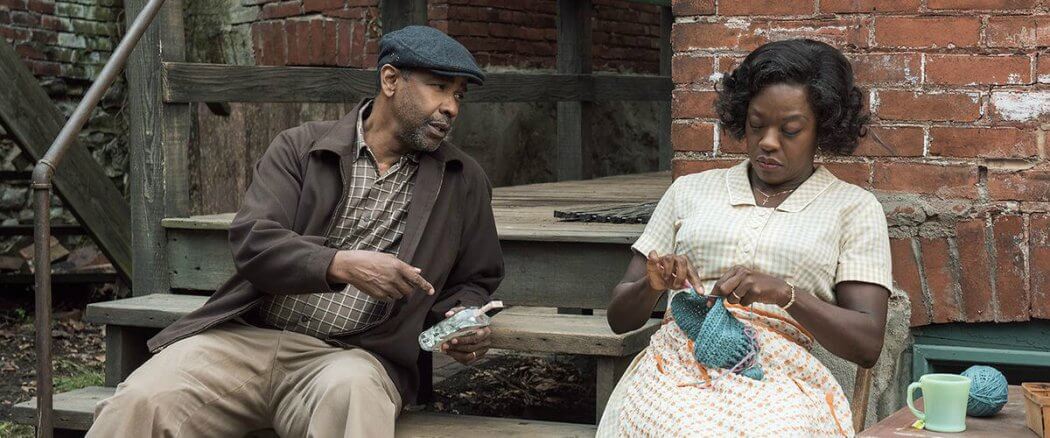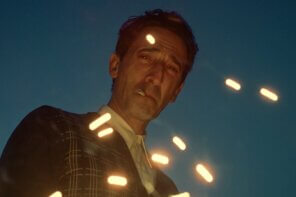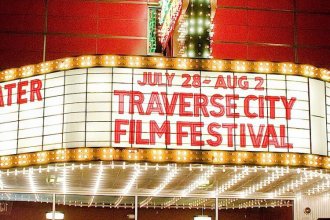During the 1950s Blacks were continuing the “Northern migration” from the Jim Crow oppression in the south to the northern states. Blacks felt that in the North at least some jobs were available to them without the overt segregation of the South. Those jobs were almost entirely of the menial variety with the understanding that Negroes would be filling those jobs that no Whites would want. Still, the possibility of escaping the enforced poverty of share-cropping in the South left many with little choice.
The Pittsburgh Cycle
August Wilson, Pulitzer Prize winning playwright, wrote the iconic 10-play “Pittsburgh Cycle” involving the last century of African American working class existence and his writings surround those years of migration. Each play chronicles every decade of the 20th century by telling stories all (save one) rooted in Pittsburgh’s Hill District where Wilson grew up, and he won Pulitzer prizes for two of the plays — The Piano Lesson (portraying the 30s) in 1990 and Fences in 1987. Fences also won a Tony when first performed on Broadway in 1987. Fences speaks of the 50s decade when Blacks were not legally segregated in the North but were, in almost every way, second class citizens. The civil rights movements of the 60s had yet to be realized. At that time there were a few cautious advancements being made toward equality with Blacks being allowed to serve in the military (since World War II) and play in the national past-time, Major League Baseball (starting in 1947 and becoming commonplace in the 50s).
An Award Winning Play
Fences was performed in a Broadway revival in 2010 starring Denzel Washington and Viola Davis in the leads and again winning a Tony Award. There had been numerous propositions to film Wilson’s plays, with most of the focus being on Fences since it is the most awarded and celebrated of them. Wilson actually had a mostly completed screenplay adaptation when he died (of liver cancer) at the far too early age of 50 in 2005. But Wilson insisted that any such film adaptation would need to be brought to the screen by a Black director. After Denzel Washington performed the play 114 times the film project was finally solidified with Denzel agreeing to direct the film. He ported five of the adult actors from the play (including himself) so the film is indeed a reenactment of the play.
The Maxons
Troy Maxon (played in an amazing performance by Denzel Washington, who has won 3 Golden Globes and 2 Oscars as well as a Tony for his Broadway performance in Fences) is a 53 year old garbage collector who lives in his small row house in a Black neighborhood of Pittsburg with his wife Rose (Viola Davis of The Help and Doubt) and teen son Cory (Jovan Adepo of TV’s The Leftovers.) Troy has lived a raucous, adventurous life. He escaped his abusive father in the South, turned to crime and ended up doing prison time and through it all was a talented baseball player. Troy remains convinced that he was a better baseball player than anyone in his time but that he was unfairly told he was too old to play when Blacks were finally allowed into the Major Leagues. And now he is a garbage collector, an occupation that makes him wince. He tries to conform to his 40-hour workweek, barely scraping by with enough money to pay the bills and a few personal pleasures (a few beers or a bottle of spirits on the weekend and, we learn, some other personal pleasures).
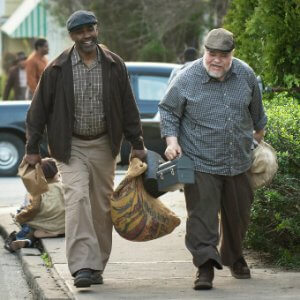 The important people in Troy’s life include his co-worker and best friend Jim Bono (played by the veteran actor Stephen Henderson who was also seen this season in Manchester by the Sea). Jim is a “follower” who idolizes Troy despite his faults… at least to a certain point. There is also his son Lyons from a previous relationship (played by Russell Hornsby) who, much to Troy’s scorn, wants to express his artistic sensibilities and play in a jazz group. And finally Troy’s brother Gabriel (Mykelti Williamson — known for Heat and Con Air as well as a veteran of many TV series) who suffered brain damage in World War II coming home with a metal plate in his head. Gabriel has been in and out of mental institutions since and he is now convinced that he is the Archangel for which he is named and will need to blow his trumpet to open heaven’s gates when the appropriate time comes. (A mentally challenged character is a common device in August Wilson’s plays.)
The important people in Troy’s life include his co-worker and best friend Jim Bono (played by the veteran actor Stephen Henderson who was also seen this season in Manchester by the Sea). Jim is a “follower” who idolizes Troy despite his faults… at least to a certain point. There is also his son Lyons from a previous relationship (played by Russell Hornsby) who, much to Troy’s scorn, wants to express his artistic sensibilities and play in a jazz group. And finally Troy’s brother Gabriel (Mykelti Williamson — known for Heat and Con Air as well as a veteran of many TV series) who suffered brain damage in World War II coming home with a metal plate in his head. Gabriel has been in and out of mental institutions since and he is now convinced that he is the Archangel for which he is named and will need to blow his trumpet to open heaven’s gates when the appropriate time comes. (A mentally challenged character is a common device in August Wilson’s plays.)
Fences is about Troy’s interaction with the six other characters (one child actor joins the cast in the last “act”). As with many stage plays, the film’s cast is sparse. The unifying narrative throughout is Rose’s desire (and Troy’s vow) to have a fence built around their back yard, the centerpiece of their home. Harkening back to days before social media and multiple choices to communicate with others, the people in Troy’s neighborhood sit on their back porches, drink whiskey or have a few beers (on Fridays) and talk politics, philosophy, their hopes, their fantasies and their own life stories. (Do we do that any longer?) Troy talks of three generations of Maxons — his abusive father, Troy himself, and his (eventually three) children born by the multiple women in his life, only one of whom permanently threw her lot in with him.
A Hard Man to Love
Troy loves each of the characters in their own way, but it is a stern, unbending love for his two boys. He ridicules their aspirations seeming to feel that their chasing after their dreams will only make more painful his failure to achieve his. On the other hand, he is overflowing with emotion for “his Rose” showering her with florid complements but not his fidelity. Similarly he has great compassion for his brother’s plight, but at the same time pockets Gabriel’s disability stipend while allowing him to wander on the streets.
Troy appears to love himself even more than anyone who surrounds him (what one of us has not?) and he is filled with righteous anger at chances missed — sure that those opportunities were stolen from him by “the man”… or even the (White?) devil. He speaks in first person of his physical battles with the devil and death itself (an homage to the Biblical story of Jacob wrestling with the angel of God?). Troy has overcome those otherworldly powers each time. And this proud but aging man speaks with confidence that he will continue to be the victor in those battles, but there is a little bit of anxious tremor in his voice when he envisions those future battles.
The Fence
With the narrative device of Fences being its namesake, Troy attempts throughout the play to build the fence. Despite much discussion, recrimination and planning, the fence is never completed until the final scenes of the film. The inability of Troy to build his fence, the neglect of his promise to finish the task, parallels Troy’s neglect of his family. He has high ideals but is unable to follow through, always blaming someone else for his issues.
At one point in his quiet wisdom Bono says, in response to both Cory and Troy questioning why Rose wants the fence built, “Some people build fences to keep people out… and other people build fences to keep people in. Rose wants to hold on to you all. She loves you.” And Rose does love her entire family — even Troy’s children from other women born out of wedlock. She is a woman of faith who has given up most of her dreams to prop up the very imperfect man she married. Not very liberated, just loving. What a shame Troy is so unable to reciprocate.
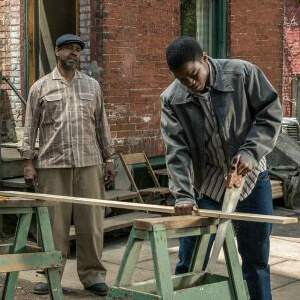 At one point Troy, full of self-pity, says “I stood on first base for eighteen years and I thought… well goddamn it… go on for it!” In one of the most moving moments of the film Rose tearfully replies “I been standing with you! I been right here with you Troy! I got a life too. I gave eighteen years of my life to stand in the same spot with you… I gave everything I had to try and erase the doubt that you wasn’t the finest man in the world. And wherever you was going… I wanted to be there with you. Cause you was my husband. Cause that’s the only way I was gonna survive as your wife. You always talking about what you give… and what you don’t have to give. But you take too. You take… and you don’t even know nobody’s giving.” But Troy can only see their marriage from his self-centered perspective and, in a line that brought about spontaneous applause in the theater, she finally tells Troy “From right now on… you a womanless man.” One more devastating loss for this man who feels his whole life has been “standing in one place.”
At one point Troy, full of self-pity, says “I stood on first base for eighteen years and I thought… well goddamn it… go on for it!” In one of the most moving moments of the film Rose tearfully replies “I been standing with you! I been right here with you Troy! I got a life too. I gave eighteen years of my life to stand in the same spot with you… I gave everything I had to try and erase the doubt that you wasn’t the finest man in the world. And wherever you was going… I wanted to be there with you. Cause you was my husband. Cause that’s the only way I was gonna survive as your wife. You always talking about what you give… and what you don’t have to give. But you take too. You take… and you don’t even know nobody’s giving.” But Troy can only see their marriage from his self-centered perspective and, in a line that brought about spontaneous applause in the theater, she finally tells Troy “From right now on… you a womanless man.” One more devastating loss for this man who feels his whole life has been “standing in one place.”
For Troy, the fence is his device to keep his failures and fears at bay. Cory at one point asks “How come you ain’t never liked me?” Furious at the question, Troy replies to his son “Liked you? Who the hell say I got to like you? What law is there say I got to like you?” Troy continues on his soul-killing rant to this teenager “Like you? I go outta here every morning, I bust my butt… ’cause I like you? You’re about the biggest fool I ever saw. A man is supposed to take care of his family. You live in my house… feed your belly with my food… put your behind on my bed… because you’re my son. It’s my duty to take care of you, I owe a responsibility to you.” For Troy it is all about “responsibility” and one can admire him that he takes that seriously. But there is no emotion in it other than duty. When Cory and Troy finally have their showdown and Cory walks away for good he tells his father “Tell Mama I’ll be back for my things“ to which Troy predictably replies “They’ll be on the other side of that fence.” Yes, that fence that shields Troy from all that does not turn out well in his life. In fact, Troy needs many fences.
Superb Acting
Denzel Washington “knows” Troy’s character in and out. This will be one of the stand-out performances of his career. I was blown away by Casey Affleck’s acting in Manchester by the Sea and I do believe he deserved his Oscar, but it is almost criminal that Denzel did not also get one for this performance. Denzel as Troy makes you recoil at his callousness and, at the same time, sympathize with the damage he has suffered that molded him to be the way he is. In the end his character is severely flawed but has an admirable nobility that his family eventually comes to see. I can’t think of any actor who could have pulled off that paradox like Denzel Washington did. And paired with Viola Davis’s fabulous Oscar winning performance, I watched the credits roll by almost exhausted by the intensity of their acting, realizing that seeing the two of them playing off each other was something I might never see repeated on the screen.
A Play or a Film?
The chief “knock” on this film is that it is a play performed on the screen. Well, yes, it is. It has about 2 mins of opening footage that are in the streets of 1950s Pittsburgh along with occasional snippets thereafter, but 95% of the film takes place in Troy and Rose’s home and, especially, their back yard — just as Wilson’s play is entirely located in that home’s small back yard. The words are almost entirely lifted from August Wilson’s theater script. And there has been little attempt to disguise the theatricality of the film — long soliloquies with characters arranged in front of the camera are the norm. Some object, but I do not. When would I have had the opportunity to see this play performed by such virtuoso artists? The memory of these characters will stay with me for the rest of my life. How can I begrudge that? I would only hope that the nine other plays of Wilson’s Pittsburgh Cycle come to the silver screen with equal impact and before I pass from this world (not likely, but I can hope.)
Final Redemption
Fences is easily available in streaming and if you have not seen it, I hope you have the privilege. It is such a watchable film, filled with beautiful brown and red colors. I have probably made it sound sadder than it is. The last scenes bring redemption to the characters with hope for the future. Gabriel gets to finally have his big day with his final declaration “That’s the way that go!” And we leave the viewing wiser and more forgiving… and unlikely to forget the very, very imperfect Troy whose family loved him so much more than he could love them back.

